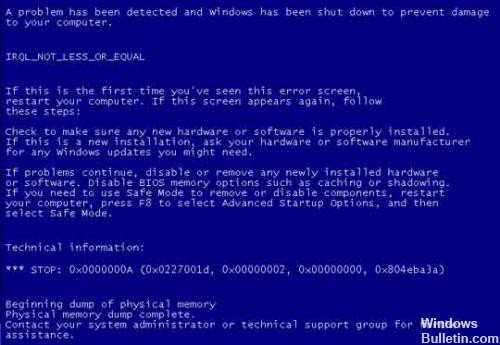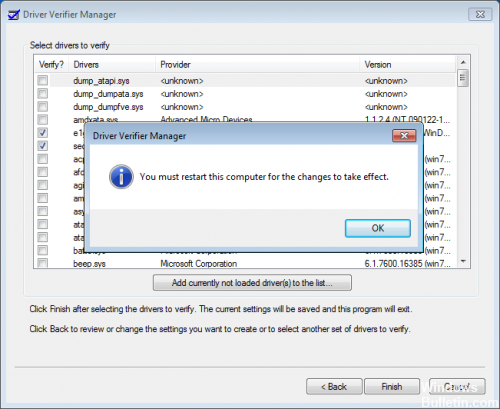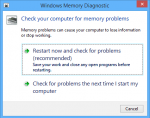Updated April 2024: Stop getting error messages and slow down your system with our optimization tool. Get it now at this link
- Download and install the repair tool here.
- Let it scan your computer.
- The tool will then repair your computer.
Make sure your device has the latest updates.
Fix #2: Install the latest updates
In some cases, making sure Windows has installed all the latest updates can resolve the IRQL NOT LESS OR EQUAL error. Make sure automatic updates are enabled. Windows Vista 7 users can type update in the search box to open Windows Update.
In fact, IRQL_NOT_LESS_OR_EQUAL (sometimes simply called “IRQL”) is usually a memory-related error that occurs when a system process or device driver tries to access memory at an address for which it does not have valid access rights.
BSOD’s are frustrating for everyone and often difficult to find. The IRQL_NOT_LESS_OR_EQUAL BSOD usually comes from a hardware driver or hardware conflict. This means one of two things: Driver problems or a bad Windows service caused by a backup utility or antivirus.

The error “Stop 0x0000000A: IRQL_NOT_LESS_OR_EQUAL” usually occurs when Windows starts. It is usually associated with a bad driver or defective or incompatible hardware or software. Technically, this error condition indicates that a process or driver in kernel mode has attempted to access a disk space for which it had no permission or too high an IRQL level (kernel interrupt request).
Disabling the problematic driver

To track the driver for the specific problem, you must run Driver Verifier, an application included with Windows.
- Click on Start
- Enter the validator in the field and press Enter.
- Select Create default settings, then click Next and select Automatically select all drivers installed on this computer.
- Click Next, and then click Finish.
- Restart your computer and you will see the list of drivers to check at startup. If a defective driver is available, you will receive a BSOD with the corresponding error message.
April 2024 Update:
You can now prevent PC problems by using this tool, such as protecting you against file loss and malware. Additionally it is a great way to optimize your computer for maximum performance. The program fixes common errors that might occur on Windows systems with ease - no need for hours of troubleshooting when you have the perfect solution at your fingertips:
- Step 1 : Download PC Repair & Optimizer Tool (Windows 10, 8, 7, XP, Vista – Microsoft Gold Certified).
- Step 2 : Click “Start Scan” to find Windows registry issues that could be causing PC problems.
- Step 3 : Click “Repair All” to fix all issues.
You can then identify and uninstall the listed driver when you log back on to Windows.
Checking your memory and hardware

You can now try to debug your computer at the hardware level.
As mentioned at the beginning, the error irql_not_less_or_equal normally occurs when something tries to access a storage space for which it has no authorization.
The first thing you need to do in this case is to test your device’s memory. Windows provides a utility that can do this for you.
Here is how to use this program:
- Open the search term > enter “Memory Diagnostics” > open the Windows memory diagnostics program.
- In the new window that opens, select one of the two available options. The first one immediately restarts Windows and allows the system to scan memory.
- If it returns an error, then you have your answer. Replace your computer’s memory and everything should work fine.
- However, if the scan did not reveal any errors, the problem lies elsewhere.
Remove USB
Sometimes it is also possible that the operating system of our computer gets this problem when installing or using external USB device drivers and using this IRQL_NOT….. BSOD error on the computer screen.
And the simple solution you can try now is to remove all connected external USB devices from your desktop or laptop and restart your computer.
After you have separated everything that is not needed from your computer, you must now use your computer as usual, just to test and check whether you still get this error or not.
https://www.dell.com/support/article/ph/en/phbsd1/sln163432/blue-screen-error-stop-0x0000000a-irql_not_less_or_equal-?lang=en
Expert Tip: This repair tool scans the repositories and replaces corrupt or missing files if none of these methods have worked. It works well in most cases where the problem is due to system corruption. This tool will also optimize your system to maximize performance. It can be downloaded by Clicking Here

CCNA, Web Developer, PC Troubleshooter
I am a computer enthusiast and a practicing IT Professional. I have years of experience behind me in computer programming, hardware troubleshooting and repair. I specialise in Web Development and Database Design. I also have a CCNA certification for Network Design and Troubleshooting.

